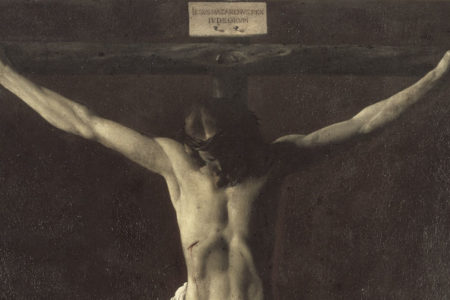Road to Righteousness
On October 31, 1517, Martin Luther nailed his 95 theses of the Christian faith to the door of the church in Wittenberg, Germany. In so doing, he started something that radically affected all of Europe, initiating the Protestant Reformation that broke away from the Roman Catholic Church’s domination of northern Europe.
In his personal struggle to find forgiveness and relief from the guilt of sin, Luther came to the understanding of justification by faith.
Human Righteousness Rejected
In Romans 3 the apostle Paul highlighted this major doctrine of biblical Christianity when he explained that the Law condemns every human being, both Jewish and Gentile:
Now we know that whatever the law says, it says to those who are under the law, that every mouth may be stopped, and all the world may become guilty before God (v. 19).
Every man is a sinner as a result of God’s law. For example, the Mosaic Law commands, “You shall have no other gods before Me” (Ex. 20:3). Yet most of us have many things that take precedence over our relationships with God. So we’re condemned.
The second law says, “You shall not make for yourself a carved [graven] image” (v. 4). Yet we create all types of items that we idolize above God.
“You shall not take the name of the Lᴏʀᴅ your God in vain” (v. 7). “Honor your father and your mother” (v. 12). God prohibits stealing, lying, and coveting (vv. 15–17). These laws continuously point out our sinfulness. The law does not make us sinners; it reveals that we are sinners and that we are condemned and accountable before God.
Romans 3:20 says the law brings the knowledge of sin because “by the deeds of the law no flesh will be justified [declared righteous] in His sight, for by the law is the knowledge of sin.” Paul said, “I would not have known sin except through the law. For I would not have known covetousness unless the law had said, ‘You shall not covet’” (7:7).
Many of us have read the Bible and suddenly said to ourselves, I didn’t realize what God thought about that. The Bible gives us knowledge of sin and an awareness of how sinful we truly are.
As King David said, the problem is that we are born in sin (Ps. 51:5). We are born with a sin nature; we never have to learn how to sin. We are condemned from the beginning. I was reared on a farm. And before I ever got out of the farmhouse, I started to disobey my parents.
Romans 3:23 says, “For all have sinned and fall short of the glory of God.” The standard is not 80 percent or 90 percent; the standard is the 100 percent holiness of God. The law points out that we fall short. We may not be the worst sinners ever, but we are as bad off as the worst because we are sinful human beings. And no human being will be made righteous by the law.
For example, suppose I committed a murder and then felt terrible about it and decided to do as many good things as possible for the rest of my life. How many good deeds would it take to undo my murder? Nothing could undo it; I would merely become a “good” murderer—not good at murdering, but a murderer who is good. By the same token, the best we can be is “good” sinners. We are sinners by nature and sinners by deed. And as a result, a holy God must reject us.
Our good deeds cannot remove our sin and make us righteous; furthermore, without His forgiveness, we have no release from guilt. Many people today are overwhelmed by guilt and don’t know where to find relief. That is the bad news.
God’s Righteousness Demonstrated
But there is good news. God demonstrated His righteousness apart from the Law. The Law separated people from God, constantly pointing out their sin by manifesting His holiness. Yet it did not help anyone relate to God.
Humanity needed another display of God’s righteousness apart from the Law. That righteousness comes through faith in Jesus Christ:
But now the righteousness of God apart from the law is revealed, being witnessed by the Law and the Prophets, even the righteousness of God, through faith in Jesus Christ, to all and on all who believe (Rom. 3:21–22).
It was necessary for God to demonstrate His righteousness publicly in the person of Jesus so that we would have help and not solely condemnation; so that we would be enabled and not disabled. Jesus, God the Son, took on human flesh so that He could die in our place. That was a demonstration of God’s righteousness, one that helps us rather than simply condemning us. Through it, we may partake of the righteousness that we could never manufacture on our own through the Law.
Jesus manifests God’s righteousness, which is available as a gift of His grace. He wants to give it to us. We can’t earn it; we can’t buy it; we can’t do enough good things to receive it.
Paul said, “For by grace you have been saved through faith, and that not of yourselves; it is the gift of God, not of works, lest anyone should boast” (Eph. 2:8–9). God’s righteousness comes to you as a free gift through faith in Jesus.
God intended for Jesus the Messiah to die (Isa. 53:5–6). It was His plan that the shedding of Jesus’ blood would publicly demonstrate that the demands of a holy God were satisfied. The Bible has always taught that “the wages of sin is death” (Rom. 6:23; cf. Ezek. 18:20). Jesus had no sin; yet He died as a criminal, for you and me. The One who was not a sinner died for sinners, and His blood was poured out for us.
That act also demonstrated God’s righteousness in that God passed over the sins of preceding generations. In the Old Testament, the Jewish people lived under the Law, which was a terrible slave master. No one could keep all of the Law; so God incorporated sacrifices that the Israelites would offer, knowing the blood of bulls and goats could not remove their sin. However, they also knew that God promised to accept the righteous and faithful manifestation of their sacrifices and to cover their sins from year to year.
So every year, on Yom Kippur, the high priest would offer animal blood as a sacrifice on the mercy seat in the Holy of Holies; and God would accept that sacrifice for another year. Thus God passed over the sins previously committed. Those sins were never forgiven; they were covered until Jesus the Messiah arrived to become the perfect and final sacrifice. That is why the book of Hebrews teaches that Jesus is a better sacrifice, offering better blood in a better Temple—the actual Temple in heaven.
His sacrifice removes sin and makes available the gift of eternal life. Thus Paul said in Romans 3:26 that God would be “just and the justifier of the one who has faith in Jesus.”
God’s Righteousness Applied
The good news is that God’s righteousness is applied as a gift of God’s grace: “Where is boasting then? It is excluded. By what law? Of works? No, but by the law of faith” (v. 27).
Those who have received Jesus as their personal Savior have been born again into God’s family and have no right to boast. They did not earn what they received; they received it as a gift from God.
Although I was privileged to have been reared in a Christian home, I was a sinner who was as lost as anyone else. And it was God’s grace that saved me. Perhaps you come from a home where there is no interest in spiritual things. That fact makes you no worse off than I was. The Bible says we are all born in the same condition: spiritually dead.
Apart from the gift of God’s grace, we have no hope. We could only become good sinners. But the gift of God’s righteousness is applied by grace. That means you cannot earn it. You can-not buy it. You cannot do enough good deeds to merit it. God’s grace is available to anyone who will enter into a relationship called faith with Jesus.
If you’re willing to express your faith in what Jesus did 2,000 years ago on the cross, God wants to give you the gift of eternal life. That’s a wonderful solution to an otherwise unsolvable problem. The Law simply condemns. But God’s righteousness is available to you as a gift through faith in Jesus. And it makes sense that, since God sent His Son, His Son would now be the only way this righteousness is accessible. Jesus said, “I am the way, the truth, and the life. No one comes to the Father except through Me” (Jn. 14:6).
Lawfully condemned men consigned to hell can appropriate God’s justification by grace through faith. God would have been just if He had let us alone. But He is not merely righteous; He is also loving. And He wants us to spend eternity with Him. So He provided for His righteousness to be manifested through Jesus, not merely through the Law. The Law was good, but it could not make us righteous.
Everyone must be saved. If the Law condemns everyone, then everyone needs to be born again. It doesn’t matter whether we are Protestants or Jews or Catholics or whatever. We must all be born again, or we will die in our sins.
As believers, we have a mandate to take this message to the world. Thousands of people are under the same misconception Martin Luther was once under, and they need to hear the truth. Anyone can be saved. It doesn’t matter who you are or what you’ve done. The gift of righteousness is available, if you will take it.
If you have never received Jesus as your Savior, you must, my friend. You must. You may provide excuses and resistance. But in the final analysis, faith in Jesus is the only way to enter into the presence of God.








I so much blessed from your this article, praise God,